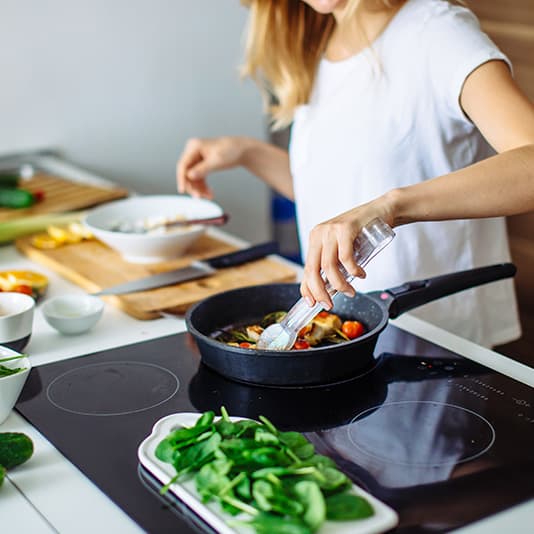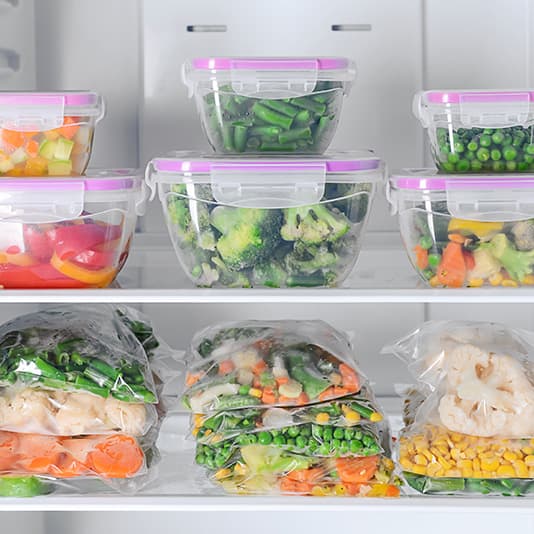Eating on a budget
Blog Article | By Simplyhealth | 19 December 2022
The cost of living crisis has had a significant impact on the nation, with many of us needing to make adjustments to even our most basic day-to-day spending habits. This significant inflation leap has meant healthy eating on a tight budget has become a challenge for many of us.
This article covers top tips to help you make good food choices without breaking the bank. These tips will also help reduce your food waste to make your money go further and do your bit to support the planet too.
Cook smarter
Making some simple adjustments to the meals you cook can help to make a big difference to your food shop bill. Christina recommends trying these tricks to help you cook smarter:
Meat can often be the most expensive component of our meals so we can cook smarter by reducing the amount we use. Divide your usual portion of meat into two meals and add extra vegetables or tinned pulses like butter beans or lentils to bulk out your dishes while also adding extra fibre and essential vitamins
Try grating veg like carrots or courgettes into mince-based dishes to allow you to use less mince
Look for tinned or frozen fish to replace fresh in your recipes as an easy way to save money without compromising on the nutrient content
Add pasta, rice or potatoes to your soups to make them go further.

Buying meat in larger quantities can be more cost effective – portion out your meat and freeze what you’re not going to use before the use-by-date
Cook double when making dishes like curries, spaghetti bolognese and casseroles. Freeze the extra batch for the following week so you have one less meal to purchase
Opting to go meat-free once or twice a week can dramatically reduce costs but also our saturated fat intake and therefore contribute to a healthier heart
You could try cheaper cuts of meat like beef brisket or shin, pork belly or cheek as just some examples. Ask a butcher for cheaper cuts of your favourite meats and try them in a slow cooker for extra tenderness and great flavour.
Shop smarter
Whether you visit the supermarket directly, or order your food shopping online, there are a number of things to consider when planning your meals which can help you to save those pennies:
The key to shopping smarter is to plan out your weeks meals beforehand and make a list of exactly what you need – it sounds obvious but doing so will reduce the likelihood that you will buy things you won’t use, or forget to buy things you will need
Before you make your grocery list make sure you check your cupboards and freezer so you’re not doubling up on things you already have
Don’t shop for groceries when you’re hungry – this may lead to you buying extras that you hadn’t planned to, increasing the cost of your bill1
Take advantage of supermarket discounts on short sell-by-dates, if you know you’ll use the item, or be able to freeze them before they go off. If you visit the supermarket in the evening, you might even be able to grab some bargain items with sell-by-dates for the end of that day.

Try out purchasing frozen and tinned fruit and veg, which are often less expensive than fresh and can be just as nutritious. Similarly, loose fruit and vegetables are often considerably less expensive than pre-packaged
Eating ‘seasonally’ can also be much less expensive2 – this basically means eating the fruit and vegetables that are harvested in the UK at the time of year they are available and that haven’t had to be imported from another country. In January in the UK, seasonal fruit and veg include apples, beetroot, brussels sprouts, carrots, celeriac, celery, chicory, Jerusalem artichokes, kale, leeks, mushrooms, onions, parsnips, pears, spring greens, spring onions, squash, swedes, and turnips.3 By incorporating these items in favour of out-of-season, imported ones you can help to save yourself money.
Smarter food storage
Smarter food storage can help keep your food fresh for longer, meaning less food waste, more food to go around and ultimately requiring you to spend less:
You can start storing smarter by keeping small fruits like strawberries, blueberries and raspberries in glass jars in the fridge. Keep the berries in a clean jam jar with the lid on and this can significantly extend the shelf life
You can keep your bagged salad fresher for longer by removing from the bag, rinsing with water, dry and place in a lunch box with some kitchen roll on top and the lid tightly secured. By reducing the air getting to your salad it will stay crisp and fresh for much longer. Similarly, if you buy a whole lettuce, you can use the same process to prolong the freshness

If you have onions or spring onions that are going off before you get a chance to use them, try chopping them and pop into your freezer in a freezer bag. You can then shake out as much or as little as you need when cooking and add to the pan straight from the freezer
If you have bananas that are going to go off, peel, chop and freeze them in a lunch box or freezer bag. You can then add these to a blender straight from frozen when making smoothies. Alternatively, over ripe bananas are perfect for baking banana bread
Save any leftover herbs by chopping them up and placing them into ice cube trays. Fill with water and place into the freezer. You can then pop out as many as you need for your cooking and add straight to your pot from frozen
Hard herbs, such as rosemary, thyme, sage and chives, will last longer if stored in the fridge — wrap them in dry kitchen roll before putting into airtight containers or resealable bags
Allow stone fruits such as nectarines, plums and mangos to ripen in a fruit bowl and then transfer to the fridge once they’re soft enough to eat; this will keep them fresh for longer
Bananas produce ethylene gas as they ripen so cover their stems with tin foil or cling film to prevent spreading of this gas and stop them from turning brown too quickly. This can increase the shelf life of your bananas by several days
Once you’ve bought your potatoes, or other supermarket veg, remove them from the plastic packaging and store loose in a cool, dry cupboard or drawer or keep them in a paper bag. The plastic bag can trap moisture, and this will make your vegetables spoil more quickly A full freezer is more economical to run.4 Store away batch-cooked meals for a rainy day. You can also use it to house everyday basics like bread, milk and leftover fruits and vegetables.
A helping hand from Simplyhealth
Through our health plans, we offer customers access to a 24/7 advice and counselling helpline. Qualified professionals are on hand to offer practical and emotional support with financial concerns such as budgeting, income reductions and much more. Sign in if you have a plan.
This material may contain links to other websites operated by third parties. It is the responsibility of third parties to ensure such material and websites comply with all relevant laws and regulations. To the maximum extent permissible by law Simplyhealth disclaims all responsibility for such websites.